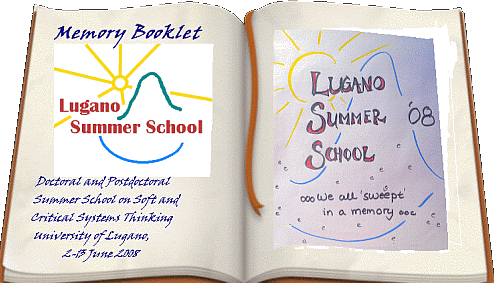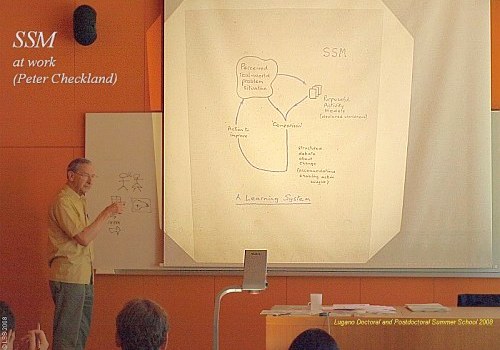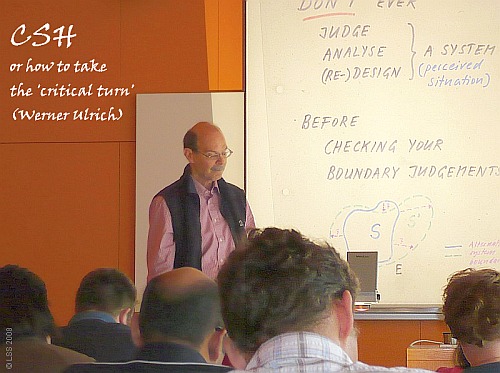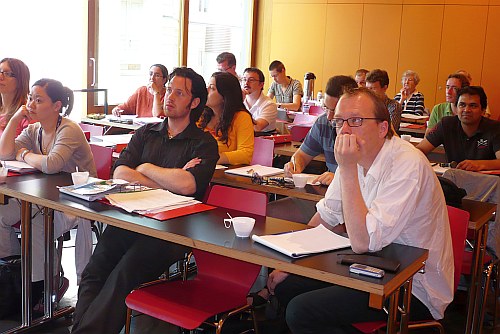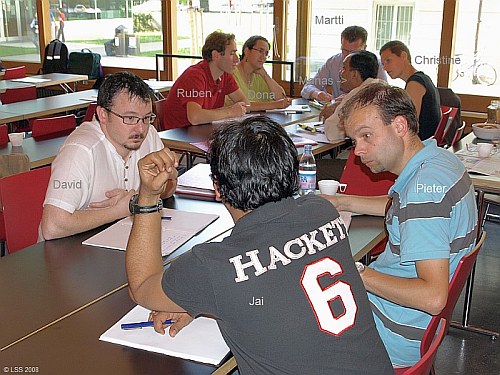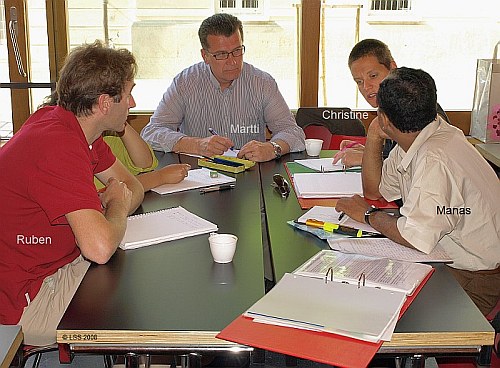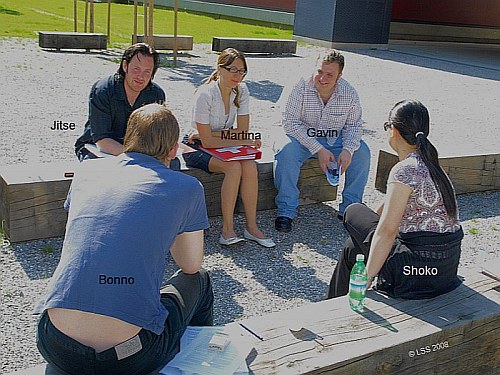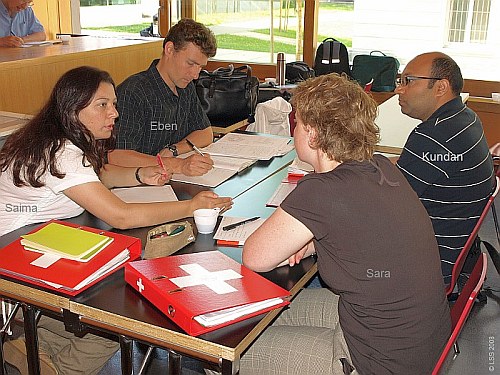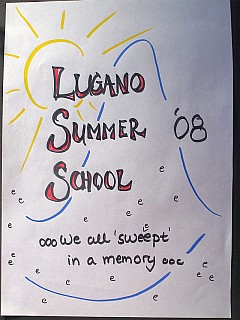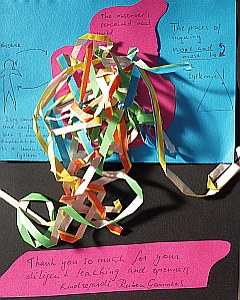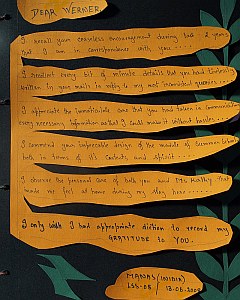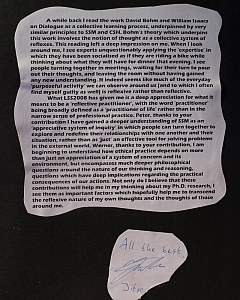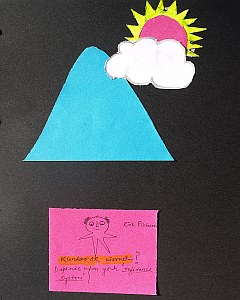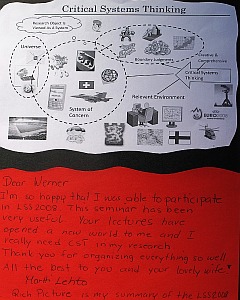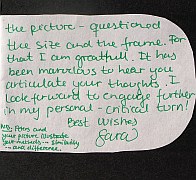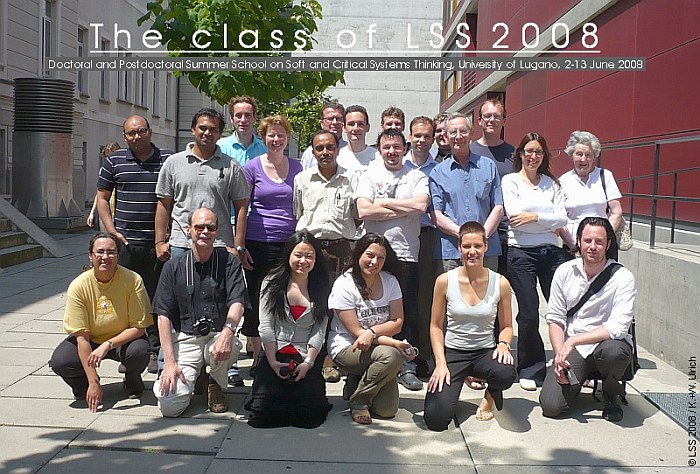Werner Ulrich's Home Page: Ulrich's Bimonthly
Formerly "Picture of the Month"
July-August 2008

Lugano Summer School (LSS 2008) memories This year's Lugano Summer School, held at the University of Lugano from the 2nd to the 13th of June, has been a particularly interesting and rewarding event. As is to be expected for a Doctoral and Postdoctoral Summer School on Soft and Critical Systems Thinking, we have had a truly remarkable group of twenty highly qualified and motivated participants. What a sympathetic and friendly bunch of people! So much commitment and response! So many interesting conversations across all cultural and professional boundaries! So many positive vibrations and good moments!
Having recently returned from Lugano with so many memories and pictures of LSS 2008, and not knowing whether I will be able to organize another event of this kind, I would like to dedicate this summer's Bimonthly to it.
|
|
For a hyperlinked overview of all issues
of "Ulrich's Bimonthly" and the previous "Picture of the
Month" series,
see the site map
Continuing education or the quest for competence Like no group of LSS participants before, this year's group included people from all age groups (from 21 to 66); from a wide array of applied disciplines such as energy policy, environmental planning and management, agricultural policy, water management, mechanical (automotive and aircraft) engineering, urban planning, transport engineering and planning, civil engineering, industrial engineering, operations research, technology management, business informatics, software engineering, Web 2.0 research, general management, human resources management, social and organizational psychology, knowledge management, management education, civil law, military science and national defense policy, science & society studies, politics, and others; and with a truly global mix of nationalities and cultural backgrounds (Australia, Denmark, Finland, Germany, India, Israel, Italy, Japan, The Netherlands, Pakistan, South Africa, Switzerland, Turkey, the United Kingdom, and the United States).
Accordingly diverse, I suspect, were the interests and expectations that motivated the participants to take part in LSS 2008. If there was one overriding theme that united them, I believe it is what I call the "quest for competence" the life-long search of every serious researcher and professional for a better understanding of what good research practice or professional practice are all about. It is with this end in view that Peter Checkland and I sought to introduce the participants to soft systems methodology (SSM) and to critical systems heuristics (CSH), as two different but in many respects complementary tools for tackling situations characterized by complexity, uncertainty, and conflict. To both Peter and myself, sound practice of these two systems approaches is inconceivable without adopting a reflective stance, or what in the last Bimonthly I discussed under the headings of a "research orientation" or "scientific attitude," that is, a stance of deferred judgment in favor of careful, systematic, and self-critical inquiry. Soft and critical systems thinking as we understand them can help us in this quest.
The academic program of LSS 2008 Here is a short description of the two introductory courses on "soft" (interpretive) and "critical" (self-reflective and emancipatory) systems thinking, adopted from the Lugano Summer School web site (please visit the School web site for full information).
SSM Soft Systems Methodology (Instructor: P.B. Checkland)
Course Goal To provide an appreciation of the history and nature of Soft Systems Methodology (SSM) so that students are in a position to begin to use it to tackle real-world problem situations.
Course Summary The course will cover the emergence of soft systems thinking and SSM in the light of the failure of systems engineering to cope with problem situations outside those defined in terms of technical objectives. SSM as a whole will be covered in its interpretive context; it will be treated as a systemic learning system with both "constitutive" and "strategic rules. The methods which form the parts of the approach will be described and illustrated in practical examples. The use of SSM as a whole will be illustrated in real-world applications in "management" situations and in the field of information systems. Finally, the course will offer some reflections on the 30-year program of action research in which SSM was developed.
Course Outline
|
(i) |
The emergence of SSM. Systems engineering and its failure in management situations. The emergence of interpretive systems thinking in its interpretive context. |
|
(ii) |
SSM I: Basic concepts and tools. |
|
(iii) |
SSM II: Applications (exercises and discussion). |
|
(iv) |
SSM III: SSM in action in real-world situations. |
CSH Critical Systems Heuristics (Instructor: W. Ulrich)
Course Goal To introduce the participants to the notion of critical systems thinking and how it translates into reflective professional practice. How can we become competent practitioners and researchers?
Course Summary In this course we aim to gain a new understanding of systems thinking as "critical" systems thinking (CST). What does critique mean, and what is its role in systems thinking? We will learn to understand systems thinking as a form of critique, and in this way will begin to appreciate the meaning and relevance of critical systems thinking for reflective research and practice. We will then introduce Critical Systems Heuristics (CSH) as a framework for practicing CST.
Course Outline
|
(i) |
The critical turn of systems thinking. Systems thinking and the quest for comprehensiveness; the problem of holism. The critical significance of the systems idea; systems thinking as a form of critique. Heuristics and critique; critical systems heuristics as a way to practice critical systems thinking. |
|
(ii) |
Critical Systems Heuristics I. Some basic lessons in critical systems thinking (with short exercises). The core principle: systemic boundary critique. Boundary categories and questions. |
|
(iii) |
Critical Systems Heuristics II. Practicing boundary critique: three basic settings. Systemic triangulation: dealing with conflicting "facts" and "values." The unfolding process: stages of ideal mapping. The emancipatory employment of boundary critique. |
|
(iv) |
Towards reflective practice. The unsolved problem of practical reason: towards a practicable model of rational systems practice. Critical systems thinking and professional ethics. The quest for professional competence: rethinking our notion of professional competence. |
Pictures: in class (N.B.: For the class picture, see bottom of this page)
Participants reflecting on their "critical turn" A core concept of my introductory course on critical systems heuristics is the notion of the "critical turn" (namely, of our understanding of the systems approach, and of rational practice in general). It is a crucial step that in my view every reflective practitioner has to take on the way towards true competence. Early in the course, I therefore invited the participants to write a short essay on the question: "What does the 'critical turn' mean for my personal understanding of systems thinking? And consequently, how does it change my notion of good research or professional practice?"
Here are a five excerpts from these essays (slightly edited). I have selected these five because I think they aptly capture the reflective spirit that the Lugano Summer School seeks to foster in its participants.
I
work for a science-based organization which is strongly influenced
by the disciplines of operations research and systems analysis (RAND-style).
My role is to support planning and decision making at the very highest
levels.
I have become deeply disillusioned with the ability of
operations research and systems analysis methods to provide a comprehensive
and rational framework for planning and decision making. Analysts
and their clients often solve the 'wrong' problem and often value
the 'wrong' things. ... [Wrong in that] as a result of an uncritical
construction of the original problem boundary [there occurs] sub-optimization
(when solutions to the problem at hand have negative effects on
other more important problems) and [there is] false confidence in
prescriptions (when exogenous factors influence our system of interest
in unpredictable ways).
As a
consequence, it is my view that good professional practice must
encompass more than just the ability to apply ever-more sophisticated
modeling techniques to pre-defined problems. It should consist
of more than methodology choice however well-informed that choice
may be. Rather, good professional practice must encompass the ability
to probe beyond the problem-as-given by the client and begin to
get a handle on the full complexity of the problem situation.
[It] should encompass an attempt to rationally and socially justify
which problem definition from a multitude of possible system-environment
characterizations the analyst should work with. (An experienced policy
analyst from Australia, 33 years old)
§
In
my professional practice (automotive/aircraft structural design),
whenever I claim to have understood and rigorously analyzed the
real or physical behavior of a structure or a system to be engineered,
I do make a claim that the choice of methods for my engineering
judgment is absolutely right. I must thus be aware that a chosen
method has its own limitations, has its own 'boundary conditions'
within which it can produce a meaningful result.
In
order to be 'competent' in my professional practice, I must inquire
into the assumptions of the engineering principles on which I rely
and ask myself: Why those assumptions have been made? What are the
implications of those assumptions for my derived solution? In a
nut-shell, I must be 'critical'. A practice of reflecting systematically
upon the problem, its proposed solutions, the kind of methods used
to derive those solutions, limitations of these methods, and assumptions
of the basic principles, can help me to be professionally 'competent'.
(A doctoral student in mechanical engineering from India, 31
years of age, with a special interest in developing low-cost, environmentally
friendly, transport systems for both urban and rural areas in developing
countries)
§
I
see good research and effective practice as meaningful manifestations
of systemic thinking. The way I see systemic thinking as something
meaningful is as a deeply personal attitude towards my experience
of and engagement with the world of existence, of which I see research
and professional practice as mere aspects. Essentially, I perceive
any engagement with my world of existence as an expression of identity
of who I am and any reflection on this engagement as an exploration
of identity. As such, systems thinking becomes an expansion of identity
through the development of an increased awareness of the many ways
in which I am connected to my world of existence. The very notion
of 'I' is in itself a judgment of boundary which presupposes the
existence of a 'not I'..
The implication of this notion is that
systemic thinking, for me, is a quest for increased responsibility
and thereby freedom. Only by increasing my awareness of the boundaries
of the 'I' the many ways in which I am connected to my world of
existence can I increase my capacity for taking responsible
action.
Now, when I reflect on
the many ways in which my understanding of 'the critical turn' might
influence my developing understanding of systems thinking, one particular
thing strikes me. Whereas my previous description implies the possibility
of an expansion of identity which aims to be fully holistic, the
critical turn implies that such an expansion to reach full holistic
comprehensiveness is in fact impossible. The very fact that every
judgment of a boundary raises a new boundary and is therefore open
to a new boundary critique, implies that the quest for comprehensiveness
is never ending metaphorically analogous to the universe as ever-expanding
at the speed of light.
No absolute claims can be made, as every
claim depends on the existence of a system of reference that gives
the normative framework for the claim. (A Dutch doctoral student
of 28 years of age, working on systems approaches to human resources
development with a view to promoting organizational and social change
of an ethical nature)
§
What
struck me today, and made me feel incompetent, was how difficult
it is to become competent. Even more so because we are using inquiry
to change the world, and therefore we will always be imperfect.
I had a look today after the session on how competent I am with
my claim-making, and this is how the thinking went.
Reginald
Revans (1980), in Action Learning, wrote 'What is an honest
man, and what can I do to become one?' Although this quotation is
transposed from a different context, it is just as valuable for
epistemological thinking, and is reminiscent of 'the critical spirit'
of research to which you refer (Ulrich, 2001).
I must say, I've
found this critical stance very intimidating, especially as it made
me look at myself without a methodology to protect me and give me
a role. It seems that when the methodology that we use (or rely
on to make our claims) is taken away, we are stripped naked, and
our (in)competence is laid bare.
I thought I was safe, since I
made use of an action research methodology, influenced by a 'grounded
theory' approach (Glaser, 1967). The way rigor is demonstrated here
(e.g., themes or concepts 'earning' their way up from the data)
is much different. It is data-driven
. [But as I now understand]
arguments, rather than tools, validate claims. So now is the time
I need to start arguing and arguing as an honest man. My claims
and thinking depend on my reference system. (An environmental
manager from South Africa, aged 29, who is currently completing
a Ph.D. on promoting reflective environmental management in local
government through action research)
§
To
be critical or not, that's the question. Finding myself at the start
of my research on the practice of water management, I have to answer
that question. To be critical is the hard way. It means that I have
to make myself vulnerable. Critical research is to clarify my assumptions.
These assumptions show my lack of knowledge. Only then can I start
to refine my assumptions and learn.
The
critical turn is a reasoned attitude to realize improvement. The
main idea is to clarify my own assumptions and to debate them with
other stakeholders involved. By debate, I can adjust my assumptions
and [so can] other stakeholders involved. The result is a common
understanding of a problem situation ...; however, I doubt [a critical
attitude alone can] provoke change. My argument is that people are
driven by their morality, not by their (common) understanding. Clarifying
assumptions and debating them to create improvement with the directly
involved is in itself a moral conviction. It is in (dis)obeying
moral convictions [rather than common understanding] that people
act. If people do not obey the moral conviction of the critical
approach, it will not work to improve a problem situation. (A
regional water manager in The Netherlands, 31 years of age, engaging
in doctoral research as a way to reflect on his current practice
as a water manager)
The Memory Booklet On the last day of this year's Summer School, I was in for a beautiful surprise. The class offered me a personal Lugano Summer School '08 Memory Booklet (another version was for Peter Checkland). I have read through and enjoyed the booklet many times since; each time it has given me a wonderful time and more than a few good laughs! In addition, two participants performed a humorous musical interpretation of some of the ideas we had discussed during the two weeks. Below I reproduce just a few of the booklet's pages, as well as the text of Gavin and Eben's "soft song," sung on the tune of Oliver Twist's "I'm reviewing the situation" (with permission from the authors). My thanks to all those who contributed to the booklet and the performance; I will treasure the memories that they help me keep alive.
Pages from the "LSS 2008 Memory Booklet" offered by the class Here are eight of the 16 pages of the booklet my cordial thanks to all who have contributed a page, including those whose page I cannot reproduce here for reasons of data volume. If you'd like to see a page in larger size, just click on it.
"I'm reviewing the situation" (i.e., the LSS 2008 experience)
A musical performance by Gavin Harper and Eben le Roux
"The Soft Song"
(This song is sung on the tune of Oliver Twist's "I'm reviewing the situation")
A
man's got a system, hasn't he?
With which he does his
research, doesn't he?
It
provides him with expertise and pride,
That he's clever, and
gets everything right.
(The normal citizens are not so clever, by the way.)
I'm
re
viewing
the situation
[clap,
then arms on side]
My perspective and epistemology? [arms on
the side]
All the trials
and tribulations
! [clap and arms on side]
Better get me now a methodology.
[arms on side]
A methodology would think for me, [dance around]
would
come for me, and go for me. [dance around]
The rigor it would
give for me. (dance around)
The structure it will bring for me.
[dance around]
A researcher it'll make of me
[dance around]
[stand
and puff
]
Hmmm I think we'd better think it out again! [scratch heads]
Haa
criticality you can keep
anyway
I'd rather be asleep
anyway.
What?!
Left without any support, or structure to hide behind
If I think, I'm naked, could my claim be true
(Or
is this now just from my perspective?)
[turn
to audience with hands upwards]
I'm
re
viewing
my root definition
[clap and arms on side]
What's my purpose, how
will I do it, to do what?
[2nd
singer does PQR] [arms on side]
This
C.A.T
and W.O.E
(and 7 plus minus twee). [clap and arms on side]
That's difficult,
no, or is it just me? (arms on the side)
Let's draw it in a picture.
[dance around]
A model I will make for me. [dance around]
Analysis,
it's 1, 2, 3. [dance around]
It's then a piece of cake for me.
[dance around]
Just don't forget the E, E, E. [dance around]
[stand
and puff
]
Hmmm I think we'd rather discuss it during T!
But
a man has some values, doesn't he?
His perspective and his system's
boundaries
And tho I'd be the first one to say I'm not
getting it clear
Why do I make this claim that I'm superior?
I'm
re
viewing
my boundary judgments
[clap, then arms on side]
My no..rms and my teleology.
[arms on the side]
All the multiple
perspectives
[clap and side]
that come as part of
criticality. [arms on the side]
Being critical and reflexive,
[dance around]
my claims not comprehensible. [dance around]
It's
an S and E, an A and U. [dance around]
It's better dialogical,
it's better democratical. [hand gestures]
It's CSH, its lesson
number 2!
Hmmm
Polemic form of reasoning is cool!
|
Here
are the instructions, for just in case you want to do
it over again
|
References
Glaser, B.G., and Strauss, A. (1967). Discovery of Grounded Theory: Strategies for Qualitative Research. Chicago, IL: Aldine.
Revans, R. (1980). Action Learning: New Techniques for Management. London: Blond & Briggs.
Ulrich, W. (2001). The quest for competence in systemic research and practice. Systems Research and Behavioral Science, 18, No. 1, pp. 3-28.
|
July 2008 |
|||||||||||||||||||||||||||||||||||||||||||||||||
|---|---|---|---|---|---|---|---|---|---|---|---|---|---|---|---|---|---|---|---|---|---|---|---|---|---|---|---|---|---|---|---|---|---|---|---|---|---|---|---|---|---|---|---|---|---|---|---|---|---|
|
|
August 2008 |
|||||||||||||||||||||||||||||||||||||||||||||||||
|---|---|---|---|---|---|---|---|---|---|---|---|---|---|---|---|---|---|---|---|---|---|---|---|---|---|---|---|---|---|---|---|---|---|---|---|---|---|---|---|---|---|---|---|---|---|---|---|---|---|
|
This Bimonthly's main picture: the class of LSS 2008 Digital photographs taken on 12 June 2008 around 12:30 p.m. on the Lugano University campus. First picture: ISO 100, aperture f/8, shutter speed 1/60, focal length 5.8 mm (equivalent to 36 mm with a conventional 35 mm camera), original resolution 2816 x 1880 pixels, reduced to 700 x 474 pixels and compressed to 122 KB. Second picture (appears when you roll your mouse over the basic picture): ISO 100, aperture f/5.0, shutter speed 1/1000, focal length 21 mm (equivalent to 42 mm with a 35 mm camera), original resolution 3648 x 2736 pixels, reduced to 700 x 500 pixels and compressed to 135 KB.
To be critical or not, that's the question.
(A Summer School participant, reflecting on his personal "critical turn")
Notepad for capturing personal thoughts »
|
Personal notes:
Write
down your thoughts before
you forget them! |
|
Last
updated 29 Apr 2022 (Memory Booklet picture), 22 Jun 2014 (title layout), 3 July 2008 (text;
first published 3 July
2008)
https://wulrich.com/bimonthly_july2008.html
